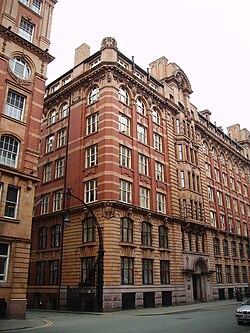India House, Manchester
 From Wikipedia - Reading time: 9 min
From Wikipedia - Reading time: 9 min
| India House | |
|---|---|
 India House, showing the listed wrought-iron gateway | |
 | |
| General information | |
| Architectural style | Edwardian Baroque |
| Address | Whitworth Street, Manchester, England |
| Year(s) built | 1906 |
| Design and construction | |
| Architect(s) | Harry S. Fairhurst |
| Designations | |
Listed Building – Grade II* | |
| Official name | India House (including attached wrought iron gateway linked to Lancaster House) |
| Designated | 2 October 1974 |
| Reference no. | 1268529 |
India House in Whitworth Street, Manchester, England, is a packing and shipping warehouse built in 1906 for Lloyd's Packing Warehouses Limited, which had, by merger, become the dominant commercial packing company in early-20th century Manchester. It is in the favoured Edwardian Baroque style[1] and is steel-framed, with cladding of buff terracotta and red brick with buff terracotta dressings.[2] It is a Grade II* listed building as of 2 October 1974.[2]
Background
[edit]The building was designed by Harry S. Fairhurst, "the leading expert in the design of these advanced warehouses".[3] Fairhurst was also responsible for Bridgewater House which stands opposite India House, and the neighbouring Lancaster House.[1] Fairhurst's huge buildings are "steel-framed and built to high-quality fireproof specifications".[3]
It was constructed for Lloyd's Packing Warehouses Limited and like many warehouses was built to a common design with steps to a raised ground floor with showroom and offices, and the first floor contained more offices and waiting rooms for clients and sample and pattern rooms all decorated to impress customers. The working areas above were plain with large windows to allow in natural light. Orders were packed there and sent to the basement on hoists powered by Manchester's hydraulic power system and packed into bales using hydraulic presses before dispatch. The warehouse was lit by gas.[4]
India House is part of a conservation area in Manchester city centre that reflects the historical importance of the textile industry in the city. The conservation area was designated by Manchester City Council in September 1974, and was bounded by Oxford Street, Portland Street, Abingdon Street, Bloom Street, Chorlton Street, Cobourg Street and the Piccadilly to Oxford Road railway viaduct. It was extended in June 1985 to include an area bounded by Whitworth Street, London Road and the above viaduct.[5]
Conversion to apartments
[edit]In 1989, Northern Counties Housing Association, now known as The Guinness Partnership converted India House into 100 residential apartments available for rent.[6][7]
Former residents
[edit]Noel Gallagher lived here at flat 47 in 1989-1993 and says "India House is literally ground zero in the story of my musical life." Gallagher wrote "Live Forever" and songs for the first two Oasis albums 'Definitely, Maybe' and 'What’s the Story, Morning Glory' while in residence.[8][9][10]
Ian Brown, the lead singer of The Stone Roses was another famous resident[11]
See also
[edit]References
[edit]Notes
- ^ a b Hartwell, Hyde & Pevsner 2004, p. 335
- ^ a b Historic England, "India House (including attached wrought iron gateway linked to Lancaster House) (1254836)", National Heritage List for England, retrieved 1 October 2012
- ^ a b Hartwell 2002, p. 207
- ^ Warehouses Whitworth Street, School of Mechanical, Aerospace and Civil Engineering Manchester University, archived from the original on 11 March 2012, retrieved 1 October 2012
- ^ "Whitworth Street Conservation Area". www.manchester.gov.uk. Manchester City Council. Retrieved 6 October 2022.
- ^ Hindle, Paul (2002). "The Influence of the Gay Village on Migration to Central Manchester" (PDF). North West Geography. 1 (2001): 54–60. Retrieved 29 August 2024.
- ^ Building the 21st Century Home: The Sustainable Urban Neighbourhood (PDF). The Architectural Press. 2 January 1999. Retrieved 29 August 2024.
- ^ Ward, Amelia (29 August 2019). "Definitely Maybe at 25: Inside the Manchester Flat Where Noel Gallagher Wrote the Epic Album". Lad Bible. Retrieved 8 October 2022.
- ^ "Noel Gallagher pictured at his old Manchester flats where the Oasis story began". Manchester Evening News. 20 December 2023. Retrieved 29 August 2024.
- ^ "Oh Manchester, so much to answer for!". Beyond The Grooves. Retrieved 29 August 2024.
- ^ "S01 E12: Living in India House". YouTube. Digital Blanket. Retrieved 29 August 2024.
Bibliography
- Hartwell, Clare; Hyde, Matthew; Pevsner, Nikolaus (2004), The Buildings of England: Lancashire: Manchester and the South East, Yale University Press, ISBN 0-300-10583-5
- Hartwell, Clare (2002), Manchester, Pevsner Architectural Guides, Yale University Press, ISBN 978-0-14-071131-8
53°28′30″N 2°14′22″W / 53.4750°N 2.2394°W
 KSF
KSF



